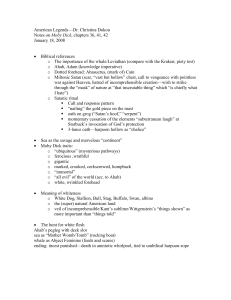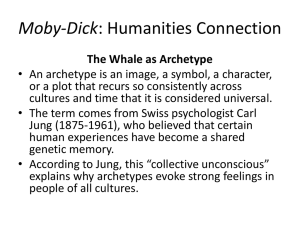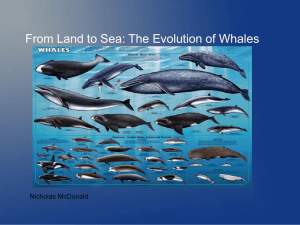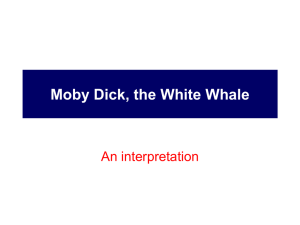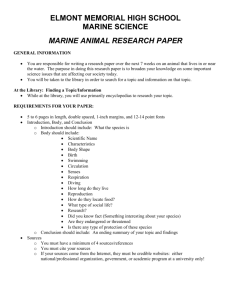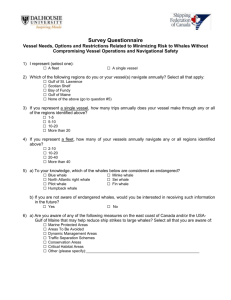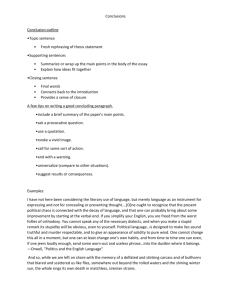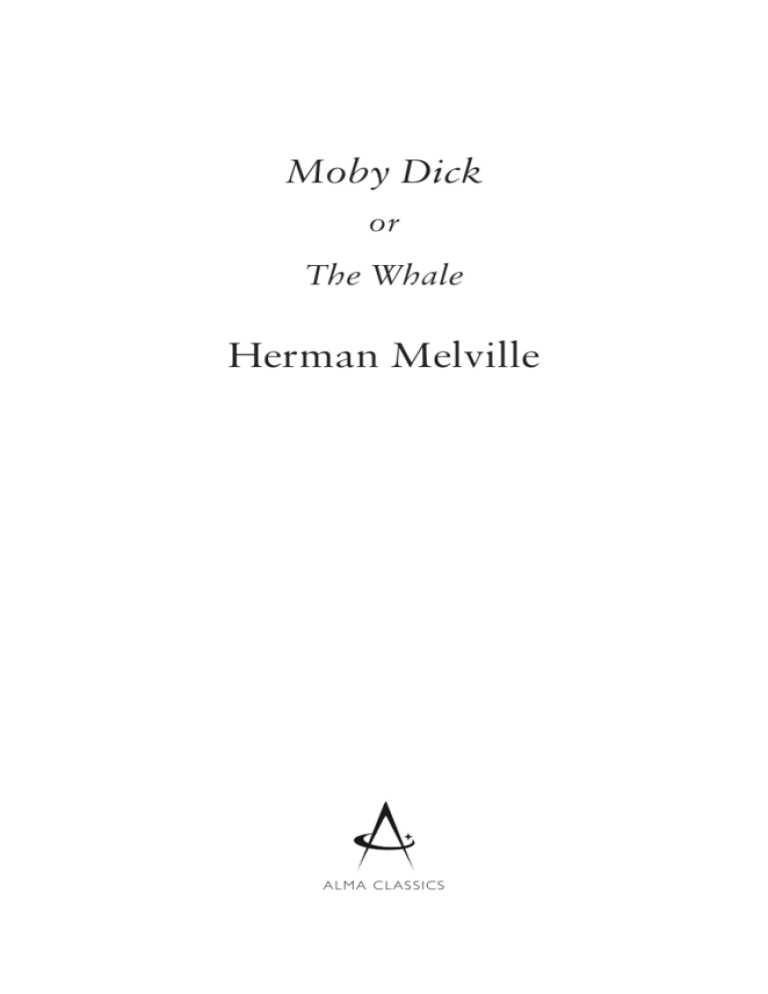
Moby Dick
or
The Whale
Herman Melville
AL MA CL AS S I CS
alma classics ltd
London House
243–253 Lower Mortlake Road
Richmond
Surrey TW9 2LL
United Kingdom
www.almaclassics.com
Moby Dick first published in 1851
First published by Alma Classics (previously Oneworld Classics) in 2011
This new edition first published by Alma Classics Ltd in 2013
Edited text, notes and background material © Alma Classics Ltd
Introduction © Jay Parini
Cover image: nathanburtondesign.com
Printed in Great Britain by CPI Group (UK) Ltd, Croydon CR0 4YY
isbn: 978-1-84749-274-6
All the materials in this volume are reprinted with permission or presumed
to be in the public domain. Every effort has been made to ascertain and
acknowledge their copyright status, but should there have been any unwitting oversight on our part, we would be happy to rectify the error in
subsequent printings.
All rights reserved. No part of this publication may be reproduced, stored
in or introduced into a retrieval system, or transmitted, in any form or
by any means (electronic, mechanical, photocopying, recording or otherwise), without the prior written permission of the publisher. This book is
sold subject to the condition that it shall not be resold, lent, hired out or
otherwise circulated without the express prior consent of the publisher.
Contents
Introduction ix
Moby Dick
Etymology
Extracts
1.
Loomings
2.
The Carpet Bag
3.
The Spouter Inn
4.
The Counterpane
5.
Breakfast
6.
The Street
7.
The Chapel
8.
The Pulpit
9.
The Sermon
10. A Bosom Friend
11. Nightgown
12. Biographical
13. Wheelbarrow
14. Nantucket
15. Chowder
16. The Ship
17. The Ramadan
18. His Mark
19. The Prophet
20. All Astir
1
5
7
19
25
29
43
47
49
52
56
59
68
72
74
77
82
84
87
100
106
110
114
iii
Moby Dick
21.
22.
23.
24.
25.
26.
27.
28.
29.
30.
31.
32.
33.
34.
35.
36.
37.
38.
39.
40.
41.
42.
43.
44.
45.
46.
47.
48.
49.
50.
51.
52.
53.
Going Aboard
Merry Christmas
The Lee Shore
The Advocate
Postscript
Knights and Squires
Knights and Squires
Ahab
Enter Ahab; To Him, Stubb
The Pipe
Queen Mab
Cetology
The Specksynder
The Cabin Table
The Masthead
The Quarterdeck
Sunset
Dusk
First Night Watch
Midnight, Forecastle
Moby Dick
The Whiteness of the Whale
Hark!
The Chart
The Affidavit
Surmises
The Mat-Maker
The First Lowering
The Hyena
Ahab’s Boat and Crew • Fedallah
The Spirit Spout
The Albatross
The Gam
iv
117
121
125
127
132
133
136
140
144
147
148
150
163
166
172
178
185
187
189
190
197
206
215
217
222
231
234
237
247
250
253
257
259
contents
54.
55.
56.
57.
58.
59.
60.
61.
62.
63.
64.
65.
66.
67.
68.
69.
70.
71.
72.
73.
74.
75.
76.
77.
78.
79.
80.
81.
82.
83.
The Town-Ho’s Story
Of the Monstrous Pictures of Whales
Of the Less Erroneous Pictures of Whales,
and the True Pictures of Whaling Scenes
Of Whales in Paint; in Teeth; in Wood; in Sheet Iron; in Stone; in Mountains; in Stars
Brit
Squid
The Line
Stubb kills a Whale
The Dart
The Crotch
Stubb’s Supper
The Whale as a Dish
The Shark Massacre
Cutting In
The Blanket
The Funeral
The Sphinx
The Jeroboam’s Story
The Monkey Rope
Stubb and Flask Kill a Right Whale,
and Then Have a Talk over Him
The Sperm Whale’s Head – Contrasted View
The Right Whale’s Head – Contrasted View
The Battering Ram
The Great Heidelberg Tun
Cistern and Buckets
The Prairie
The Nut
The Pequod Meets the Virgin
The Honour and Glory of Whaling
Jonah Historically Regarded
v
263
282
287
291
294
297
300
304
309
311
313
321
324
326
328
331
333
336
342
346
352
356
359
362
364
368
371
374
384
387
Moby Dick
84.
85.
86.
87.
88.
89.
90.
91.
92.
93.
94.
95.
96.
97.
98.
99.
100.
101.
102.
103.
104.
105.
106.
107.
108.
109.
110.
111.
112.
113.
114.
Pitchpoling
The Fountain
The Tail
The Grand Armada
Schools and Schoolmasters
Fast Fish and Loose Fish
Heads or Tails
The Pequod Meets the Rosebud
Ambergris
The Castaway
A Squeeze of the Hand
The Cassock
The Try Works
The Lamp
Stowing Down and Clearing Up
The Doubloon
Leg and Arm • The Pequod, of Nantucket, Meets the Samuel Enderby, of London
The Decanter
A Bower in the Arsacides
Measurement of the Whale’s Skeleton
The Fossil Whale
Does the Whale’s Magnitude Diminish? Will He Perish?
Ahab’s Leg
The Carpenter
Ahab and the Carpenter
Ahab and Starbuck in the Cabin
Queequeg in his Coffin
The Pacific
The Blacksmith
The Forge
The Gilder
vi
389
392
397
402
414
418
422
425
432
435
439
443
445
450
451
454
460
467
472
476
479
483
487
490
493
497
500
506
508
511
515
contents
115.
116.
117.
118.
119.
120.
The Pequod Meets the Bachelor
The Dying Whale
The Whale Watch
The Quadrant
The Candles
The Deck Towards the End of the First Night Watch
121. Midnight – The Forecastle Bulwarks
122. Midnight Aloft – Thunder and Lightning
123. The Musket
124. The Needle
125. The Log and Line
126. The Lifebuoy
127. The Deck
128. The Pequod Meets the Rachel
129. The Cabin
130. The Hat
131. The Pequod Meets the Delight
132. The Symphony
133. The Chase – First Day
134. The Chase – Second Day
135. The Chase – Third Day
Epilogue
Note on the Text
Notes
Extra Material
Herman Melville’s Life
Herman Melville’s Works
Select Bibliography
517
520
522
524
527
534
535
537
538
541
545
548
552
554
558
560
565
567
571
580
588
599
601
601
623
625
644
651
vii
Introduction
By Jay Parini
Moby Dick is the great American novel. Its imaginative power and
ferocity, its humour and pathos, lift it high in the world of Western
literature, and Herman Melville ranks among the likes of Tolstoy
and Dickens as a master of this form. Nevertheless, it remains a
difficult book in many ways, in part because of its encyclopedic nature, in part because of the density of language, which is poetic in
its aspirations and effects, with its many echoes of the Bible, Milton
and Shakespeare.
Melville was writing out of deep experience. Born into a relatively
poor family with aristocratic origins in 1819, the author was forced
to drop out of school for economic reasons (his father died when he
was twelve, leaving the family without resources). He never attended
a university, so opportunities for gainful employment were limited.
At nineteen, he crossed the Atlantic on a packet ship, working as a
“green boy”. Two years later, he signed onto a whaler, the Acushnet,
sailing from New Bedford – the American capital of the whaling
industry – on 3rd January 1851. He worked his way up over some
eighteen months to the position of bow oarsman, the position held
by the narrator of his novel, Ishmael. He may possibly have tried his
hand as a harpooneer as well.
Captain Valentine Pease of the Acushnet served vaguely as the
model for the mad Captain Ahab of Moby Dick, although one can
assume that Pease and Ahab were very different men. Ahab becomes,
in Melville’s fantasy, a figure of immense weight, a symbolic figure
whose name is synonymous with fanaticism. Ahab wants to kill Moby
Dick, the white sperm whale who has caused him to lose a leg on a
previous expedition. His pursuit of this particular whale becomes an
allegory – the story of how obsession leads to destruction. Ahab’s
thirst for vengeance threatens to destroy everything in his command.
He has no regard whatsoever for the lives of his men. Everything
ix
Moby Dick
lies in submission to his iron-clad wish to destroy this whale, whose
whiteness itself is symbolic, as Melville suggests: while one usually
associates whiteness with purity, as in a wedding dress, here whiteness
stands for emptiness, a lack of meaning, or a meaning so complex
that it remains beyond anyone’s comprehension. To Ahab, the great
whale is nothing short of evil, although the reader must wonder at this
interpretation, as nothing in nature can really be evil of itself. This
whale is simply a creature of the deep, bent on survival.
Melville abandoned the Acushnet in the South Seas, jumping ship
with a friend to explore an exotic island called Nuka Hiva, where he
was kidnapped by cannibals – the subject of his first book, Typee: A
Peep at Polynesian Life (1846). He wrote several books based on his
experience in the Pacific, including Omoo (1847) and Mardi (1849).
Redburn (1849) was published shortly after Omoo, and it tells the
story of the author’s first venture aboard ship on the crossing to Liverpool. White-Jacket (1850) is an account of Melville’s journey aboard
a naval frigate that took him from Hawaii to Boston on the final leg
of his great journey. Taken as a whole, these early books represent a
vast exertion of artistic energy by Melville.
By the time he sat down to write Moby Dick, he had become accustomed to mining his experiences of a decade before. His various
passages by sea, and his adventures aboard a variety of ships, offered
a huge trove of source material for his books. Beginning Moby Dick,
he assumed he would write a straightforward account of whaling. It
would be an adventure story, and he hoped to make a great deal of
money from his book, as he lived in genteel poverty, always having to
borrow money from friends and relatives.
In the summer of 1850, Melville moved his family from New York
City to the Berkshires, a lovely area of western Massachusetts where
he had spent time as a boy on his uncle’s estate. He bought a farmhouse in Pittsfield, and he called it Arrowhead. His wife, mother
and first child lived with him in this rambling homestead, with its
barns and surrounding fields and forests. From the window of his
study, he could see the luminous hump of Mount Greylock to the
north. Melville wrote in a letter: “I have a sort of sea-feeling here
in the country, now that the ground is all covered with snow. I look
out from my window in the morning when I rise as I would out of
a porthole of a ship in the Atlantic. My room seems a ship’s cabin;
x
introduction
and at nights when I wake up and hear the wind shrieking, I almost
fancy there is too much sail on the house, and I had better go on the
roof and rig in the chimney.”
One of Melville’s close neighbours in the Berkshires was Nathaniel
Hawthorne, fifteen years his elder, who had recently published The
Scarlet Letter, one of the finest works of American fiction. The two
quickly became friends. In fact, Melville grew obsessed with Hawthorne – pursuing him with a tenacity worthy of Ahab. He wanted
Hawthorne’s approval, even his love. Hawthorne was himself less
than receptive to such intimacy, and he withdrew, although he urged
Melville to create in Moby Dick a novel of allegorical scope, with
spiritual and moral depths. The younger author responded to this
call from Hawthorne, and he dug deeper and deeper, fashioning a
profound narrative that explores the isolation of the human soul. (The
American philosopher Ralph Waldo Emerson had famously likened the
soul to a ship at sea, and this association was hardly lost on Melville.)
The novel was written in a frenzy of composition and published
in 1851 (to mixed reviews and few sales, much to the author’s disappointment). At work in Pittsfield, Melville surrounded himself with
books about whaling and tales of adventures at sea. He was reading,
for example, Thomas Beale’s Natural History of the Sperm Whale as
well as Etchings of a Whaling Cruise by J. Ross Browne. In 1820, the
Essex, an American whaler, was attacked and destroyed by a sperm
whale. A first mate on this ship, Owen Chase, published his Narrative
of the Most Extraordinary and Distressing Shipwreck of the Whale
Ship Essex only a year later, and this book fascinated Melville. Another
important source for him was an account by the explorer Jeremiah N.
Reynolds, who in 1839 published a description of another whale who
attacked ships. This was called Mocha Dick, “an old bull whale, of
prodigious size and strength.” Mocha Dick was also “white as wool”.
One sees here the literal origins of Melville’s legendary whale.
The novel came quickly but not without difficulties: “I am halfway
in the work,” he wrote to a friend. “It will be a strange sort of book,
tho’, I fear; blubber is blubber you know; tho’ you might get oil out
of it, the poetry runs as hard as sap from a frozen maple tree – and to
cook the thing up, one must needs throw in a little fancy, which from
the nature of the thing, must be ungainly as the gambols of the whales
themselves. Yet I mean to give the truth of the thing, spite of this.”
xi
Moby Dick
The novel moves inexorably from its initial opening salvo, in which
the voice of the narrator is established firmly:
Call me Ishmael. Some years ago – never mind how long precisely – having little or no money in my purse, and nothing particular to interest me
on shore, I thought I would sail about a little and see the watery part
of the world. It is a way I have of driving off the spleen, and regulating
the circulation. Whenever I find myself growing grim about the mouth;
whenever it is a damp, drizzly November in my soul; whenever I find
myself involuntarily pausing before coffin warehouses, and bringing
up the rear of every funeral I meet, and especially whenever my hypos
get such an upper hand of me, that it requires a strong moral principle
to prevent me from deliberately stepping into the street, and methodically knocking people’s hats off – then, I account it high time to get to
sea as soon as I can. This is my substitute for pistol and ball. With a
philosophical flourish Cato throws himself upon his sword; I quietly
take to the ship. There is nothing surprising in this. If they but knew it,
almost all men in their degree, some time or other, cherish very nearly
the same feelings towards the ocean with me.
In a sense, everything you need to know to read Moby Dick lies in full
view. Ishmael is deeply concerned with naming things, even himself.
His name is symbolic: Ishmael in the Old Testament was the illegit­
imate son of Abraham and a slave. He was a wanderer. His name is
synonymous with the isolated individual, the alienated “hero” of
modern fiction, which Melville’s novel anticipates in such vivid ways.
He is poor and bored with his life on shore. He is prone to “spleen”,
attacks of melancholy, which he refers to as his “hypos”, which is hypo­
chondria – in the nineteenth century another word for depression. He
is deeply unsettled by nature, and might resort to “pistol and ball” in
the wrong situation. But he suppresses this violence and goes to sea.
One hears poetic rhythms in this opening soliloquy. The language is
dense, imagistic and musical. There is a great deal of repetition, with
parallel phrases forming syntactical echoes. Considerable learning
will be found here as well, such as the reference to Cato, an important
figure in the Roman Republic, an idealistic fellow who killed himself
in dramatic circumstances because of looming political oppression.
Many political allusions will be found in this book too; indeed, the
ship itself becomes a microcosm, and the major characters represent
xii
introduction
various aspects of society. Ishmael and Ahab are primary of course:
the narrator and his mad captain. The harpooneers aboard this vessel
come from the fringes of society: Queequeg, Tashtego and Daggoo.
Their names radiate foreignness. The mates are called Starbuck, Stubb
and Flask, and each of these vivid creatures stands in for the variety
of human temperament. This is true of everyone in the novel.
Thomas Hobbes, in the opening sentence of Leviathan (1651),
wrote: “By art is created that great Leviathan, called a Commonwealth
or State (in Latin, civitas) which is but an artificial man.” Melville
pulled this quote for a section of Moby Dick called ‘Extracts’, and it’s
fascinating to contemplate his associations. Certainly the metaphor of
the “ship of state” was buried here, and Melville would have seen the
Pequod – the ship on which Ishmael sails – as a little world in itself that
mirrors the larger world. The hierarchy of a ship, of course, is fixed,
but it causes tensions, much as the class lines in society create tensions.
Melville often refers to these tensions, and makes the comparison
between life at sea and life on land, as in Chapter 60, where he writes:
All men live enveloped in whale lines. All are born with halters round
their necks, but it is only when caught in the swift, sudden turn of death,
that mortals realize the silent, subtle, ever-present perils of life. And if
you be a philosopher, though seated in the whaleboat, you would not
at heart feel one whit more of terror, than though seated before your
evening fire with a poker, and not a harpoon, by your side.
The “ever-present perils of life” obsess Ishmael, much as the “evil”
whale obsesses Ahab.
Ahab is a dictatorial leader, a lonely man (despite a “girl-wife”
and son on shore) who has spent forty years at sea. He gives singlemindedness a bad name, fixing on this white whale, determined to
destroy him. Even as he attacks him at the climax of the novel, he
cannot let go of his all-consuming wish for revenge, crying: “To the
last I grapple with thee.”
Through Ahab and his control of his men, Melville explores the
origins of totalitarian thought. Within the spatial boundaries of the
ship and its political environment, everyone aboard the Pequod is
subsumed into a single entity, as we read in Chapter 134: “They were
one man, not thirty. For as the one ship that held them all… was put
together of all contrasting things… even so, all the individualities of
xiii
Moby Dick
the crew, this man’s valour, that man’s fear; guilt and guiltlessness, all
varieties were welded into oneness, and were all directed to that fatal
goal which Ahab their one lord and keel did point to.”
Of course rebellion was never far from Melville’s mind. Mutiny
was always an option – and a key point of discussion among seamen.
Melville was himself the grandson of political revolutionaries: both
of his grandfathers were heroes of the American Revolution. Yet the
book moves beyond politics to metaphysics, exploring the nature of
human consciousness itself. Writing in Studies in Classic American
Literature (1923), D.H. Lawrence sees Moby Dick as a spiritual quest
with psychological dimensions. The whale represents “our deepest
blood-nature”, he says. Ahab hunts down this nature, himself standing
in for “the maniacal fanaticism of mental consciousness”.
It was Emerson, in Nature (1836), who noted a correspondence
between the inner and outer worlds. Melville follows in his wake, transposing inner and outer worlds to sea and land, asking us in Chapter
58 to “consider them both, the sea and the land”. He continues: “do
you not find a strange analogy to something in yourself? For as this
appalling ocean surrounds the verdant land, so in the soul of man
there lies one insular Tahiti, full of peace and joy, but encompassed
by all the horrors of the half known life.”
This is a huge grab bag of a book, with something for every reader.
(Henry James called such books “loose baggy monsters.”) Any number
of themes mingle in this narrative, from politics and religion to the
contemplation of revenge and the nature of human nature. The whale
in its indomitable aspect represents nature at its most elemental – perhaps the unconscious mind itself. One can hardly fight nature in this
basic sense, as one cannot step aside from the unconscious. Melville
seems to suggest that it is pointless to struggle against fate. In a way,
the white whale also represents salvation, as Melville associates the
whale with Matsya, Avatar of Vishnu, the Hindu god who comes in
one of his many incarnations as a massive fish. Indeed, the learned
Melville refers to Moby Dick as Lord Vishnu, first among whales and
a deity of sorts for whalers.
One reads Moby Dick for pleasure and edification. It’s one of those
limitless texts, a classic, and it contains a great deal of wisdom and
knowledge. It is also a narrative of remarkable force, and its force is like
the sea itself: a powerful moving body of words that one cannot resist.
xiv
Moby Dick
In Token
of My Admiration for His Genius
This Book Is Inscribed
to
NATH AN IEL H AWTH O R N E
Etymology
(Supplied by a Late Consumptive Usher to a Grammar School)
[The pale Usher – threadbare in coat, heart, body and brain: I see
him now. He was ever dusting his old lexicons and grammars, with a
queer handkerchief, mockingly embellished with all the gay flags of all
the known nations of the world. He loved to dust his old grammars;
it somehow mildly reminded him of his mortality.]
Etymology
While you take in hand to school others, and to teach them by
what name a whale fish is to be called in our tongue, leaving out,
through ignorance, the letter H, which almost alone maketh up
the signification of the word, you deliver that which is not true.
Hakluyt
WHALE * * * Sw. and Dan. hval. This animal is named from roundness or rolling; for in Dan. hvalt is arched or vaulted.
Webster’s Dictionary
WHALE. * * * It is more immediately from the Dut. and Ger. Wallen;
A.S. Walw-ian, to roll, to wallow.
Richardson’s Dictionary
תןHebrew
κητος Greek
CETUSLatin
WHÆLAnglo-Saxon
HVALDanish
WALDutch
HWALSwedish
HVALURIcelandic
5
WHALEEnglish
BALEINEFrench
BALLENASpanish
PEKEE-NUEE-NUEEFegee
PEHEE-NUEE-NUEEErromangoan
6
Extracts
(Supplied by a Sub-Sub-Librarian)
[It will be seen that this mere painstaking burrower and grub
worm of a poor devil of a Sub-Sub appears to have gone through
the long Vaticans and street stalls of the earth, picking up whatever random allusions to whales he could anyways find in any
book whatsoever, sacred or profane. Therefore you must not, in
every case at least, take the higgledy-piggledy whale statements,
however authentic, in these extracts, for veritable gospel cetology.
Far from it. As touching the ancient authors generally, as well as
the poets here appearing, these extracts are solely valuable or
entertaining as affording a glancing bird’s-eye view of what has
been promiscuously said, thought, fancied and sung of leviathan,
by many nations and generations, including our own.
So fare thee well, poor devil of a Sub-Sub, whose commentator I am. Thou belongest to that hopeless, sallow tribe which
no wine of this world will ever warm, and for whom even pale
sherry would be too rosy-strong, but with whom one sometimes
loves to sit, and feel poor-devilish, too, and grow convivial upon
tears, and say to them bluntly, with full eyes and empty glasses,
and in not altogether unpleasant sadness – give it up, Sub-Subs!
For by how much the more pains ye take to please the world,
by so much the more shall ye for ever go thankless! Would that
I could clear out Hampton Court and the Tuileries for ye! But
gulp down your tears and hie aloft to the royal mast with your
hearts; for your friends who have gone before are clearing out the
seven-storied heavens, and making refugees of long-pampered
Gabriel, Michael and Raphael, against your coming. Here ye
strike but splintered hearts together – there, ye shall strike unsplinterable glasses!]
7
Moby Dick
Extracts
And God created great whales.
Genesis
Leviathan maketh a path to shine after him;
One would think the deep to be hoary.
Job
Now the Lord had prepared a great fish to swallow up Jonah.
Jonah
There go the ships; there is that Leviathan whom thou hast made to play
therein.
Psalms
In that day, the Lord with his sore, and great, and strong sword, shall punish
Leviathan the piercing serpent, even Leviathan that crooked serpent, and he
shall slay the dragon that is in the sea.
Isaiah
And what thing soever besides cometh within the chaos of this monster’s
mouth, be it beast, boat or stone, down it goes all incontinently that foul
great swallow of his, and perisheth in the bottomless gulf of his paunch.
Holland’s Plutarch’s Morals
The Indian Sea breedeth the most and the biggest fishes that are: among
which the Whales and Whirlpooles called Balænæ, take up as much in length
as four acres or arpens of land.
Holland’s Pliny
Scarcely had we proceeded two days on the sea, when about sunrise a great
many whales and other monsters of the sea appeared. Among the former, one
was of a most monstrous size. […] This came towards us, open-mouthed,
raising the waves on all sides, and beating the sea before him into a foam.
Tooke’s Lucian “The True History”
He visited this country also with a view of catching horse whales, which had
bones of very great value for their teeth, of which he brought some to the
King. […] The best whales were catched in his own country, of which some
8
extracts
were forty-eight, some fifty yards long. He said that he was one of six who
had killed sixty in two days.
Other or Octher’s verbal narrative taken down
from his mouth by King Alfred. ad 890
And whereas all the other things, whether beast or vessel, that enter into
the dreadful gulf of this monster’s (whale’s) mouth, are immediately lost
and swallowed up, the sea gudgeon retires into it in great security, and
there sleeps.
Montaigne – Apology for Raimond Sebond
Let us fly, let us fly! Old Nick take me if it is not Leviathan described by the
noble prophet Moses in the life of patient Job.
Rabelais
This whale’s liver was two cartloads.
Stowe’s Annals
The great Leviathan that maketh the seas to seethe like boiling pan.
Lord Bacon’s Version of the Psalms
Touching that monstrous bulk of the whale or ork we have received nothing
certain. They grow exceeding fat, insomuch that an incredible quantity of
oil will be extracted out of one whale.
Ibid. “History of Life and Death”
The sovereignest thing on earth is parmacetti for an inward bruise.
King Henry
Very like a whale.
Hamlet
Which to recure, no skill of leach’s art
Mote him availle, but to returne againe
To his wound’s worker, that with lovely dart,
Dinting his breast, had bred his restless paine,
Like as the wounded whale to shore flies from the maine.
The Fairie Queen
Immense as whales, the motion of whose vast bodies can in a peaceful calm
trouble the ocean till it boil.
Sir William Davenant. Preface to Gondibert
9
Moby Dick
What spermacetti is, men might justly doubt, since the learned Hofmannus
in his work of thirty years, saith plainly, Nescio quid sit.
Sir T. Browne. Of Sperma Ceti and the
Sperma Ceti Whale. Vide his V.E.
Like Spencer’s Talus with his iron flail
He threatens ruin with his ponderous tail.
[…]
Their fixed jav’lins in his side he wears,
And on his back a grove of pikes appears.
Walter’s Battle of the Summer Islands
By art is created that great Leviathan, called a Commonwealth or State – (in
Latin, Civitas) which is but an artificial man.
Opening sentence of Hobbes’s Leviathan
Silly Mansoul swallowed it without chewing, as if it had been a sprat in the
mouth of a whale.
Holy War
That sea beast
Leviathan, which God of all his works
Created hugest that swim the ocean stream.
Paradise Lost
There Leviathan,
Hugest of living creatures, on the deep
Stretched like a promontory sleeps or swims,
And seems a moving land, and at his gills
Draws in, and at his trunk spouts out a sea.
Ibid.
The mighty whales which swim in a sea of water, and have a sea of oil swimming in them.
Fuller’s Profane and Holy State
So close behind some promontory lie
The huge Leviathans to attend their prey,
And give no chace, but swallow in the fry,
Which through their gaping jaws mistake the way.
Dryden’s Annus Mirabilis
10
extracts
While the whale is floating, at the stern of the ship, they cut off his head,
and tow it with a boat as near the shore as it will come, but it will be
aground in twelve or thirteen foot water.
Thomas Edge’s
Ten Voyages to Spitsbergen, in Purchass
In their way they saw many whales sporting in the ocean, and in wantonness fuzzing up the water through their pipes and vents, which nature has
placed on their shoulders.
Sir T. Herbert’s
Voyages into Asia and Africa. Harris Coll.
Here they saw such huge troops of whales, that they were forced to proceed
with a great deal of caution for fear they should run their ship upon them.
Schouten’s Sixth Circumnavigation
We set sail from the Elbe, wind N.E. in the ship called the Jonas-in-theWhale. […]
Some say the whale can’t open his mouth, but that is a fable. […]
They frequently climb up the masts to see whether they can see a whale,
for the first discoverer has a ducat for his pains. […]
I was told of a whale taken near Hitland, that had above a barrel of
herrings in his belly. […]
One of our harpooneers told me that he caught once a whale in Spitsbergen that was white all over.
A Voyage to Greenland, ad 1671. Harris Coll.
Several whales have come in upon this coast (Fife). Anno 1652, one eighty
foot in length of the whalebone kind came in, which (as I was informed)
beside a vast quantity of oil, did afford 500 weight of baleen. The jaws
of it stand for a gate in the garden of Pitfirren.
Sibbald’s Fife and Kinross
Myself have agreed to try whether I can master and kill this Spermaceti
whale, for I could never hear of any of that sort that was killed by any
man, such is his fierceness and swiftness.
Richard Stafford’s Letter from the Bermudas.
Phil. Trans. ad 1668
Whales in the sea
God’s voice obey.
N.E. Primer.
11
Moby Dick
We saw also abundance of large whales, there being more in these southern
seas, as I may say, by a hundred to one, than we have to the northwards of us.
Captain Cowley’s Voyage round the Globe. ad 1729
…and the breath of the whale is frequently attended with such an insupportable smell, as to bring on a disorder of the brain.
Ulloa’s South America
To fifty chosen sylphs of special note,
We trust the important charge, the petticoat.
Oft have we known that seven-fold fence to fail,
Tho’ stiff with hoops and armed with ribs of whale.
Rape of the Lock
If we compare land animals in respect to magnitude, with those that take
up their abode in the deep, we shall find they will appear contemptible
in the comparison. The whale is doubtless the largest animal in creation.
Goldsmith, Nat. His.
If you should write a fable for little fishes, you would make them speak like
great whales.
Goldsmith to Johnson
In the afternoon we saw what was supposed to be a rock, but it was found
to be a dead whale, which some Asiatics had killed, and were then towing
ashore. They seemed to endeavour to conceal themselves behind the whale,
in order to avoid being seen by us.
Cook’s Voyages
The larger whales, they seldom venture to attack. They stand in so great dread of
some of them, that when out at sea they are afraid to mention even their names,
and carry dung, brimstone, juniper wood and some other articles of the same
nature in their boats, in order to terrify and prevent their too near approach.
Uno Von Troil’s Letters on Banks’s and
Solander’s Voyage to Iceland in 1772
The spermacetti whale found by the Nantuckois, is an active, fierce animal,
and requires vast address and boldness in the fishermen.
Thomas Jefferson’s Whale Memorial to
the French minister in 1788
And pray, sir, what in the world is equal to it?
Edmund Burke’s reference in Parliament
to the Nantucket whale fishery
12
extracts
Spain – a great whale stranded on the shores of Europe.
Edmund Burke (somewhere)
A tenth branch of the King’s ordinary revenue, said to be grounded on
the consideration of his guarding and protecting the seas from pirates and
robbers, is the right to royal fish, which are whale and sturgeon. And these,
when either thrown ashore or caught near the coasts, are the property of
the King.
Blackstone
Soon to the sport of death the crews repair:
Rodmond unerring o’er his head suspends
The barbed steel, and every turn attends.
Falconer’s Shipwreck
Bright shone the roofs, the domes, the spires,
And rockets flew self-driven,
To hang their momentary fires
Amid the vault of heaven.
So fire with water to compare,
The ocean serves on high,
Up-spouted by a whale in air,
To express unwieldy joy.
Cowper, on the Queen’s Visit to London
Ten or fifteen gallons of blood are thrown out of the heart at a stroke, with
immense velocity.
John Hunter’s account of the dissection of a
whale (a small-sized one)
The aorta of a whale is larger in the bore than the main pipe of the
waterworks at London Bridge, and the water roaring in its passage through
that pipe is inferior in impetus and velocity to the blood gushing from the
whale’s heart.
Paley’s Theology
The whale is a mammiferous animal without hind feet.
Baron Cuvier
In 40 degrees south, we saw spermacetti whales, but did not take any till the
first of May, the sea being then covered with them.
Colnett’s Voyage for the Purpose of
Extending the Spermacetti Whale Fishery
13
Moby Dick
In the free element beneath me swam,
Floundered and dived, in play, in chace, in battle,
Fishes of every colour, form and kind,
Which language cannot paint, and mariner
Had never seen; from dread Leviathan
To insect millions peopling every wave:
Gather’d in shoals immense, like floating islands,
Led by mysterious instinct through that waste
And trackless region, though on every side
Assaulted by voracious enemies,
Whales, sharks and monsters, arm’d in front or jaw,
With swords, saws, spiral horns or hooked fangs.
Montgomery’s World before the Flood
Io! Pæan! Io! sing,
To the finny people’s king.
Not a mightier whale than this
In the vast Atlantic is;
Not a fatter fish than he,
Flounders round the Polar Sea.
Charles Lamb’s Triumph of the Whale
In the year 1690 some persons were on a high hill observing the whales spouting and sporting with each other, when one observed: there – pointing to the
sea – is a green pasture where our children’s grandchildren will go for bread.
Obed Macy’s History of Nantucket
I built a cottage for Susan and myself and made a gateway in the form of a
Gothic arch, by setting up a whale’s jawbones.
Hawthorne’s Twice-Told Tales
She came to bespeak a monument for her first love, who had been killed by
a whale in the Pacific Ocean, no less than forty years ago.
Ibid.
“No, sir, ’tis a right whale,” answered Tom. “I saw his spout; he threw up a
pair of as pretty rainbows as a Christian would wish to look at. He’s a raal
oil-butt, that fellow!”
Cooper’s Pilot
The papers were brought in, and we saw in the Berlin Gazette that whales
had been introduced on the stage there.
Eckermann’s Conversations with Goethe
14
extracts
“My God! Mr Chase, what is the matter?” I answered. “We have been stove
by a whale.”
“Narrative of the Shipwreck of the Whale Ship Essex of
Nantucket, which was attacked and finally destroyed by a
large Sperm Whale in the Pacific Ocean.” By Owen Chase
of Nantucket, first mate of said vessel. New York. 1821.
A mariner sat on the shrouds one night,
The wind was piping free;
Now bright, now dimmed, was the moonlight pale,
And the phospher gleamed in the wake of the whale,
As it floundered in the sea.
Elizabeth Oakes Smith
The quantity of line withdrawn from the different boats engaged in the
capture of this one whale amounted altogether to 10,440 yards or nearly six
English miles. […]
Sometimes the whale shakes its tremendous tail in the air, which, cracking
like a whip, resounds to the distance of three or four miles.
Scoresby
Mad with the agonies he endures from these fresh attacks, the infuriated
sperm whale rolls over and over; he rears his enormous head, and with wide
expanded jaw snaps at everything around him; he rushes at the boats with
his head; they are propelled before him with vast swiftness, and sometimes
utterly destroyed.
[…] It is a matter of great astonishment that the consideration of the
habits of so interesting, and, in a commercial point of view, of so important
an animal (as the sperm whale) should have been so entirely neglected, or
should have excited so little curiosity among the numerous, and many of
them competent observers, that of late years must have possessed the most
abundant and the most convenient opportunities of witnessing their habitudes.
Thomas Beale’s History of the Sperm Whale, 1839
The Cachalot (Sperm Whale) is not only better armed than the True Whale
(Greenland or right whale) in possessing a formidable weapon at either
extremity of its body, but also more frequently displays a disposition to employ those weapons offensively, and in a manner at once so artful, bold and
mischievous, as to lead to its being regarded as the most dangerous to attack
of all the known species of the whale tribe.
Frederick Debell Bennett’s Whaling
Voyage Round the Globe, 1840
15
Moby Dick
October 13. “There she blows,” was sung out from the masthead.
“Where away?” demanded the captain.
“Three points off the lee bow, sir.”
“Raise up your wheel. Steady!”
“Steady, sir.”
“Masthead ahoy! Do you see that whale now?”
“Ay ay, sir! A shoal of sperm whales! There she blows! There she breaches!”
“Sing out! Sing out every time!”
“Ay ay, sir! There she blows! There – there – thar she blows – bowes – bo-o-o-s!”
“How far off?”
“Two miles and a half.”
“Thunder and lightning! So near! Call all hands!”
J. Ross Browne’s Etchings of a Whaling Cruise, 1846
The whale ship Globe, on board of which vessel occurred the horrid transactions we are about to relate, belonged to the island of Nantucket.
“Narrative of the Globe Mutiny” by Lay
and Hussey, survivors. ad 1828
Being once pursued by a whale which he had wounded, he parried the assault
for some time with a lance, but the furious monster at length rushed on the
boat; himself and comrades only being preserved by leaping into the water
when they saw the onset was inevitable.
Missionary Journal of Tyerman and Bennet
“Nantucket itself,” said Mr Webster, “is a very striking and peculiar portion of
the national interest. There is a population of eight or nine thousand persons,
living here in the sea, adding largely every year to the national wealth by the
boldest and most persevering industry.”
Report of Daniel Webster’s Speech in the US
Senate, on the application for the Erection of a
Breakwater at Nantucket, 1828
The whale fell directly over him, and probably killed him in a moment.
“The Whale and his Captors, or The Whaleman’s Adventures
and the Whale’s Biography, as Gathered on the Homeward
Cruise of the Commodore Preble” by Revd Henry T. Cheever
“If you make the least damn bit of noise,” replied Samuel, “I will send you
to hell.”
Life of Samuel Comstock (the mutineer), by his brother,
William Comstock. Another Version of the whale ship Globe narrative.
16
extracts
The voyages of the Dutch and English to the Northern Ocean, in order, if
possible, to discover a passage through it to India, though they failed of their
main object, laid open the haunts of the whale.
McCulloch’s Commercial Dictionary
These things are reciprocal; the ball rebounds, only to bound forwards again;
for now in laying open the haunts of the whale, the whalemen seem to have
indirectly hit upon new clues to that same mystic North-West Passage.
From “Something” unpublished
It is impossible to meet a whale ship on the ocean without being struck by her
mere appearance. The vessel under short sail, with lookouts at the mastheads,
eagerly scanning the wide expanse around them, has a totally different air from
those engaged in a regular voyage.
Currents and Whaling. US Ex. Ex.
Pedestrians in the vicinity of London and elsewhere may recollect having seen
large curved bones set upright in the earth, either to form arches over gateways,
or entrances to alcoves, and they may perhaps have been told that these were
the ribs of whales.
Tales of a Whale Voyager to the Arctic Ocean
It was not till the boats returned from the pursuit of these whales, that the whites
saw their ship in bloody possession of the savages enrolled among the crew.
Newspaper Account of the Taking
and Retaking of the Whale ship Hobomock
It is generally well known that out of the crews of whaling vessels (American)
few ever return in the ships on board of which they departed.
Cruise in a Whale Boat
Suddenly a mighty mass emerged from the water, and shot up perpendicularly
into the air. It was the whale.
Miriam Coffin or the Whale Fishermen
The whale is harpooned to be sure, but bethink you, how you would manage
a powerful unbroken colt, with the mere appliance of a rope tied to the root
of his tail.
A Chapter on Whaling in Ribs and Trucks
On one occasion I saw two of these monsters (whales), probably male and
female, slowly swimming, one after the other, within less than a stone’s throw
of the shore (Terra Del Fuego) over which the beech tree extended its branches.
Darwin’s Voyage of a Naturalist
17
Moby Dick
“Stern all!” exclaimed the mate, as, upon turning his head, he saw the distended jaws of a large sperm whale close to the head of the boat, threatening
it with instant destruction. “Stern all, for your lives!”
Wharton the Whale-Killer
So be cheery, my lads, let your hearts never fail,
While the bold harpooneer is striking the whale!
Nantucket Song
Oh, the rare old whale, mid storm and gale
In his ocean home will be
A giant in might, where might is right,
And king of the boundless sea.
Whale Song
18
1
Loomings
C
all me Ishmael. Some years ago – never mind how long
precisely – having little or no money in my purse, and nothing
particular to interest me on shore, I thought I would sail about a little
and see the watery part of the world. It is a way I have of driving off the
spleen, and regulating the circulation. Whenever I find myself growing
grim about the mouth; whenever it is a damp, drizzly November in
my soul; whenever I find myself involuntarily pausing before coffin
warehouses, and bringing up the rear of every funeral I meet, and
especially whenever my hypos* get such an upper hand of me, that
it requires a strong moral principle to prevent me from deliberately
stepping into the street, and methodically knocking people’s hats
off – then, I account it high time to get to sea as soon as I can. This is
my substitute for pistol and ball. With a philosophical flourish Cato
throws himself upon his sword;* I quietly take to the ship. There is
nothing surprising in this. If they but knew it, almost all men in their
degree, some time or other, cherish very nearly the same feelings
towards the ocean with me.
There now is your insular city of the Manhattoes,* belted round by
wharves as Indian isles by coral reefs – commerce surrounds it with
her surf. Right and left, the streets take you waterwards. Its extreme
downtown is the Battery, where that noble mole is washed by waves,
and cooled by breezes, which a few hours previous were out of sight
of land. Look at the crowds of water-gazers there.
Circumambulate the city of a dreamy Sabbath afternoon. Go from
Corlear’s Hook to Coenties Slip, and from thence, by Whitehall,
northwards. What do you see? Posted like silent sentinels all around
the town, stand thousands upon thousands of mortal men fixed in
ocean reveries. Some leaning against the spiles, some seated upon the
pier heads, some looking over the bulwarks of ships from China, some
19
Moby Dick
high aloft in the rigging, as if striving to get a still better seaward peep.
But these are all landsmen – of weekdays pent up in lath and plaster,
tied to counters, nailed to benches, clinched to desks. How then is
this? Are the green fields gone? What do they here?
But look! Here come more crowds, pacing straight for the water,
and seemingly bound for a dive. Strange! Nothing will content them
but the extremest limit of the land; loitering under the shady lee of
yonder warehouses will not suffice. No. They must get just as nigh
the water as they possibly can without falling in. And there they
stand – miles of them – leagues. Inlanders all, they come from lanes
and alleys, streets and avenues – north, east, south and west. Yet here
they all unite. Tell me, does the magnetic virtue of the needles of the
compasses of all those ships attract them thither?
Once more. Say, you are in the country, in some highland of lakes.
Take almost any path you please, and ten to one it carries you down
in a dale, and leaves you there by a pool in the stream. There is magic
in it. Let the most absent-minded of men be plunged in his deepest
reveries – stand that man on his legs, set his feet a-going, and he will
infallibly lead you to water, if water there be in all that region. Should
you ever be athirst in the great American desert, try this experiment,
if your caravan happen to be supplied with a metaphysical professor.
Yes, as everyone knows, meditation and water are wedded for ever.
But here is an artist. He desires to paint you the dreamiest, shadiest,
quietest, most enchanting bit of romantic landscape in all the valley
of the Saco.* What is the chief element he employs? There stand his
trees, each with a hollow trunk, as if a hermit and a crucifix were
within, and here sleeps his meadow, and there sleep his cattle, and up
from yonder cottage goes a sleepy smoke. Deep into distant woodlands winds a mazy way, reaching to overlapping spurs of mountains
bathed in their hillside blue. But though the picture lies thus tranced,
and though this pine tree shakes down its sighs like leaves upon this
shepherd’s head, yet all were vain, unless the shepherd’s eye were fixed
upon the magic stream before him. Go visit the Prairies in June, when
for scores on scores of miles you wade knee-deep among tiger lilies –
what is the one charm wanting? Water – there is not a drop of water
there! Were Niagara but a cataract of sand, would you travel your
thousand miles to see it? Why did the poor poet of Tennessee,* upon
suddenly receiving two handfuls of silver, deliberate whether to buy
20
1. loomings
him a coat, which he sadly needed, or invest his money in a pedestrian
trip to Rockaway Beach?* Why is almost every robust healthy boy
with a robust healthy soul in him, at some time or other crazy to go
to sea? Why upon your first voyage as a passenger, did you yourself
feel such a mystical vibration, when first told that you and your ship
were now out of sight of land? Why did the old Persians hold the sea
holy? Why did the Greeks give it a separate deity, and make him the
own brother of Jove?* Surely all this is not without meaning. And still
deeper the meaning of that story of Narcissus, who because he could
not grasp the tormenting, mild image he saw in the fountain, plunged
into it and was drowned. But that same image, we ourselves see in all
rivers and oceans. It is the image of the ungraspable phantom of life,
and this is the key to it all.
Now, when I say that I am in the habit of going to sea whenever I
begin to grow hazy about the eyes, and begin to be over-conscious of
my lungs, I do not mean to have it inferred that I ever go to sea as a
passenger. For to go as a passenger you must needs have a purse, and a
purse is but a rag unless you have something in it. Besides, passengers
get seasick, grow quarrelsome, don’t sleep of nights, do not enjoy
themselves much, as a general thing – no, I never go as a passenger; nor,
though I am something of a salt, do I ever go to sea as a commodore,
or a captain, or a cook. I abandon the glory and distinction of such
offices to those who like them. For my part, I abominate all honourable
respectable toils, trials and tribulations of every kind whatsoever. It is
quite as much as I can do to take care of myself, without taking care
of ships, barques, brigs, schooners and whatnot. And as for going as
cook – though I confess there is considerable glory in that, a cook
being a sort of officer on shipboard – yet, somehow, I never fancied
broiling fowls – though once broiled, judiciously buttered and judgematically salted and peppered, there is no one who will speak more
respectfully, not to say reverentially, of a broiled fowl than I will. It is
out of the idolatrous dotings of the old Egyptians upon broiled ibis
and roasted river horse, that you see the mummies of those creatures
in their huge bakehouses the Pyramids.
No, when I go to sea, I go as a simple sailor, right before the mast,
plumb down into the forecastle, aloft there to the royal masthead.*
True, they rather order me about some, and make me jump from spar
to spar, like a grasshopper in a May meadow. And at first, this sort
21
Moby Dick
of thing is unpleasant enough. It touches one’s sense of honour, particularly if you come of an old established family in the land, the Van
Rensselaers, or Randolphs, or Hardicanutes. And more than all, if just
previous to putting your hand into the tar pot, you have been lording
it as a country schoolmaster, making the tallest boys stand in awe of
you. The transition is a keen one, I assure you, from a schoolmaster
to a sailor, and requires a strong decoction of Seneca and the Stoics*
to enable you to grin and bear it. But even this wears off in time.
What of it, if some old hunks of a sea captain orders me to get a
broom and sweep down the decks? What does that indignity amount
to, weighed, I mean, in the scales of the New Testament? Do you
think the Archangel Gabriel thinks anything the less of me, because
I promptly and respectfully obey that old hunks in that particular
instance? Who ain’t a slave? Tell me that. Well, then, however the
old sea captains may order me about – however they may thump and
punch me about, I have the satisfaction of knowing that it is all right;
that everybody else is one way or other served in much the same way
– either in a physical or metaphysical point of view, that is, and so
the universal thump is passed round, and all hands should rub each
other’s shoulder blades, and be content.
Again, I always go to sea as a sailor, because they make a point of
paying me for my trouble, whereas they never pay passengers a single
penny that I ever heard of. On the contrary, passengers themselves
must pay. And there is all the difference in the world between paying
and being paid. The act of paying is perhaps the most uncomfortable
infliction that the two orchard thieves entailed upon us. But being
paid – what will compare with it? The urbane activity with which
a man receives money is really marvellous, considering that we so
earnestly believe money to be the root of all earthly ills, and that on
no account can a monied man enter heaven. Ah! How cheerfully we
consign ourselves to perdition!
Finally, I always go to sea as a sailor, because of the wholesome
exercise and pure air of the forecastle deck. For as in this world,
headwinds are far more prevalent than winds from astern (that is, if
you never violate the Pythagorean maxim),* so for the most part the
commodore on the quarterdeck gets his atmosphere at second hand
from the sailors on the forecastle. He thinks he breathes it first, but
not so. In much the same way do the commonalty lead their leaders
22
1. loomings
in many other things, at the same time that the leaders little suspect
it. But wherefore it was that after having repeatedly smelt the sea
as a merchant sailor, I should now take it into my head to go on a
whaling voyage; this the invisible police officer of the Fates, who has
the constant surveillance of me, and secretly dogs me, and influences
me in some unaccountable way – he can better answer than anyone
else. And, doubtless, my going on this whaling voyage formed part of
the grand programme of Providence that was drawn up a long time
ago. It came in as a sort of brief interlude and solo between more
extensive performances. I take it that this part of the bill must have
run something like this:
G rand Contested E lection
for the Presidency of the United States.
Whaling voyage by one Ishmael.
B lo o dy bat t l e i n A f g h a n i s ta n.
Though I cannot tell why it was exactly that those stage managers, the
Fates, put me down for this shabby part of a whaling voyage, when
others were set down for magnificent parts in high tragedies, and short
and easy parts in genteel comedies, and jolly parts in farces – though
I cannot tell why this was exactly, yet, now that I recall all the circumstances, I think I can see a little into the springs and motives which,
being cunningly presented to me under various disguises, induced me
to set about performing the part I did, besides cajoling me into the
delusion that it was a choice resulting from my own unbiased free will
and discriminating judgement.
Chief among these motives was the overwhelming idea of the great
whale himself. Such a portentous and mysterious monster roused all
my curiosity. Then the wild and distant seas where he rolled his island
bulk, the undeliverable, nameless perils of the whale – these, with all
the attending marvels of a thousand Patagonian sights and sounds,
helped to sway me to my wish. With other men, perhaps, such things
would not have been inducements, but as for me, I am tormented with
an everlasting itch for things remote. I love to sail forbidden seas, and
land on barbarous coasts. Not ignoring what is good, I am quick to
perceive a horror, and could still be social with it – would they let
23
Moby Dick
me – since it is but well to be on friendly terms with all the inmates
of the place one lodges in.
By reason of these things, then, the whaling voyage was welcome;
the great floodgates of the wonder-world swung open, and in the wild
conceits that swayed me to my purpose, two and two there floated
into my inmost soul endless processions of the whale, and, midmost
of them all, one grand hooded phantom, like a snow hill in the air.
24

